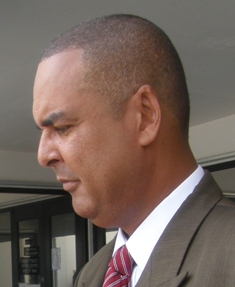Dixon trial speeds up as lawyers agree to cut witnesses
 (CNS): With agreement between both the Crown counsel and the defence that a significant number of the prosecution’s witnesses do not need to be called to the stand, the case against Rudolph Dixon will soon close, leaving his lawyers ready to open his defence. Following the appearance of former chief superintendent, Derek Haines, and Richard Oliver from the Operation Tempura team yesterday morning (Thursday) the Crown will be completing its case on Friday with admissions to the jury about what is agreed with the defence.
(CNS): With agreement between both the Crown counsel and the defence that a significant number of the prosecution’s witnesses do not need to be called to the stand, the case against Rudolph Dixon will soon close, leaving his lawyers ready to open his defence. Following the appearance of former chief superintendent, Derek Haines, and Richard Oliver from the Operation Tempura team yesterday morning (Thursday) the Crown will be completing its case on Friday with admissions to the jury about what is agreed with the defence.
The Crown was originally set to call around 23 witnesses. However, following a ruling this morning from the presiding judge, Charles Quinn, based on legal submissions from the defence yesterday afternoon, the prosecution will close its case against the Deputy Commissioner Rudolph Dixon for misconduct in a public officer or perverting the course of justice considerably earlier than expected. Dixon’s defence is then expected to begin calling its witnesses before the jury retires to decide the verdict sometime early next week.
During his brief appearance on the stand Derek Haines confirmed a passing conversation with Dixon the morning after the incident in which Rudolph Evans was released after his arrest for a DUI on the night of 7 April. Haines said he did not think that Dixon had said at the time that the person was Evans and he had learned of that much later.
The former senior officer said that as part of their morning pleasantries, having both arrived a few minutes earlier for a senior police meeting, the two men had talked and he had listened to Dixon explain what had happened and how he had advised Inspector Burman Scott to release the driver based on a previous court case with similar circumstances of an officer in plain clothes being involved in the arrest. Haines confirmed that Dixon had casually asked him what he thought and Haines stated he may not have given the same advice but considered it water under the bridge. Haines also confirmed that the former governor’s son, Mervin Cumber,, had been charged on a number of occasions for DUI.
Haines confirmed that the rumour mill in the RCIPS was rife and, to the amusement of the court, noted that if people didn’t know your business then they would soon make it up, so he could have learnedthe details of the incident on the marl road. Asked if Dixon had tried to cover the incident or keep it a secret, Haines said he hadn’t.
Testimony from the last witness offered by the Crown, Richard Oliver, revealed the key area of disagreement between the Crown and the defence, which is the legal case on which Dixon says he was offering the advice to Scott. Oliver, a member of the Special Police Investigation team, told the court that he had been asked to read some research that the team had unearthed relating to the Cumber case. Oliver said the one he had been given involved the conviction being overturned because the breathalyzer used by the police in the incident had not been properly gazetted for use.
The defence, however, has noted a number of times before the jury that this is not the case upon which Dixon relies for his defence and has always insisted he advised Scott on a case involving Cumber where the conviction had failed because a plain clothes officer was involved with the arrest.
Category: Headline News

